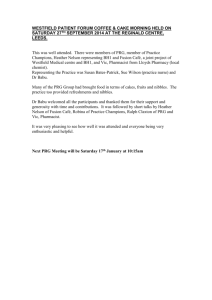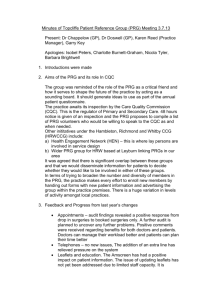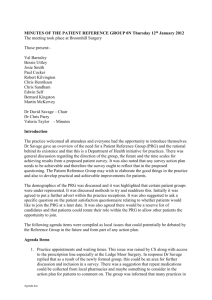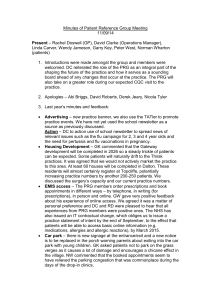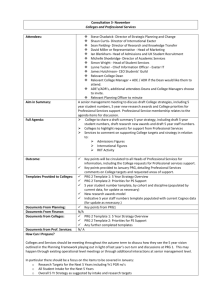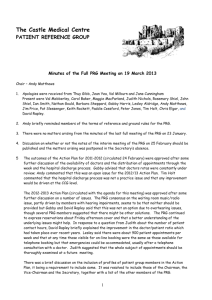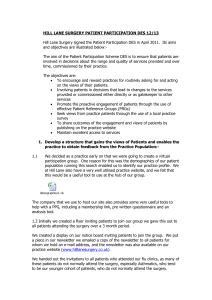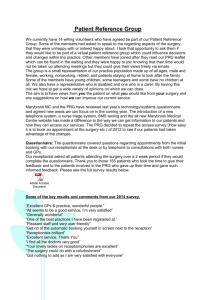Student Experience Peer Review Group report 2013-14
advertisement
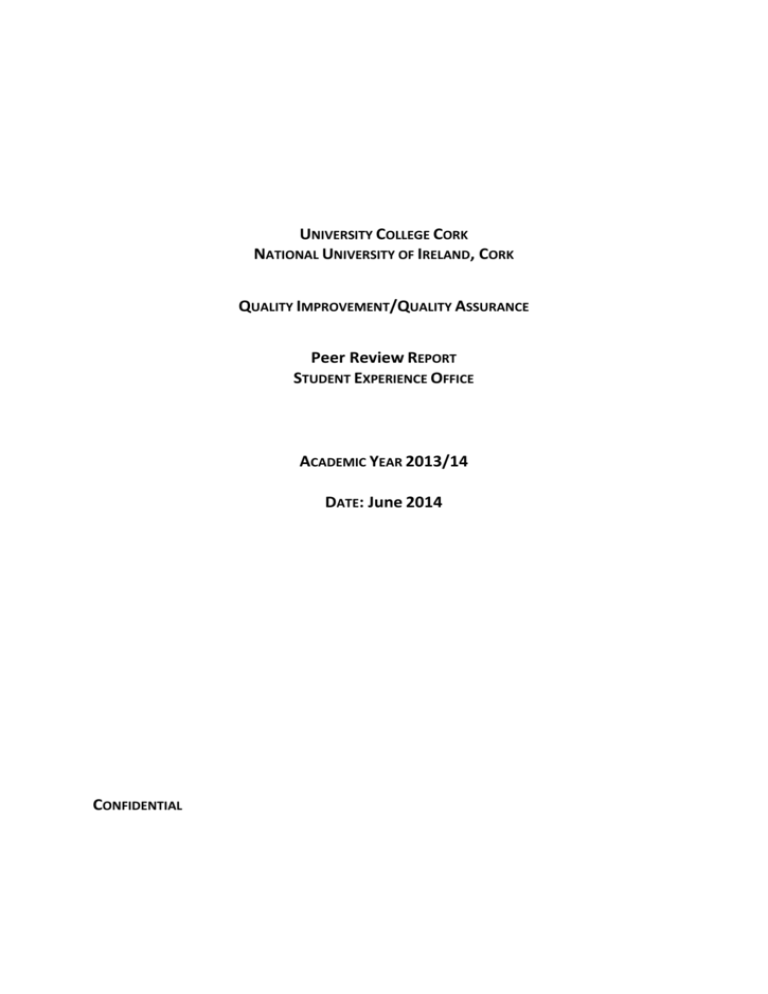
UNIVERSITY COLLEGE CORK NATIONAL UNIVERSITY OF IRELAND, CORK QUALITY IMPROVEMENT/QUALITY ASSURANCE Peer Review REPORT STUDENT EXPERIENCE OFFICE ACADEMIC YEAR 2013/14 DATE: June 2014 CONFIDENTIAL Peer Review Group Members Name Position/Discipline Institution Mr Brian Gormley Manager of Campus Life Dublin Institute of Technology Mr Padraig Haughney Student Union President University College Cork Dr Bettie Higgs Co-Director of Ionad Bairre, the Teaching & Learning Centre and Senior Lecturer, School of Biological, Earth & Environmental Sciences University College Cork Mr Stephen McAuliffe Academic Registrar Ms Denise McCarthy University of Essex Deputy President & Vice President for Union of Students of Ireland Timetable of Visit The timetable for the site visit is appended at Annex A. The timetable that was arranged for the site visit allowed the PRG to explore a range of perspectives across the SEO over two days. However, the timetable was tight due to the large number of services included in the SEO. There was insufficient time to visit all of the SEO facilities and so lunchtime on the 2nd day was allocated to visiting the Mardyke Arena and the Student Health Centre, as well as a brief visit to the information desk in the Student Centre. The PRG requested more time to speak with representatives of Senior Management. Site visit : The site visit was well organised and instructive. During the site visit the peer review group met with groups of staff from the Office of the Student Experience, as well as from selected associated offices. In each meeting the peer review group asked staff to comment on the strengths of the SEO, and also on operations that could be improved. Staff were asked to comment on their own staff development opportunities and perceived needs. There was usually sufficient time to ask staff to raise any significant issue that they felt had not been covered. The PRG also met with Student Services Staff as a group. The PRG noted the high attendance, which was felt indicated a high level of engagement with the process. The PRG asked staff to work in groups to answer questions set by the PRG. The PRG noted enthusiastic communication and feedback by the staff groups, there was an emphasis on staff strengths, staff developments, staff care and staff recognition. The site visit included a tour of the facilities of the SEO. On Day 1, the PRG visited the Assistive Technology Lab in the Boole Library Building; Mature Student Common Room in the Windle Building; the Accommodation and Societies Office on College Road; the Iona Building which housed Chaplaincy and the Meditation Space / Prayer Room on College Road; the Disability Support Service in the South Lodge; the Students’ Union offices on College Road; and the Careers Service on Western Road. The PRG were escorted on the tour by two student Peer Leaders, Shama and Tomás, who were very knowledgeable of the campus and student support services. On Day 2, the PRG visited the Mardyke Arena, the Student Health Centre, and managed a brief visit to the information desk in the Student Centre. Page 2 of 23 Peer Review Group Report Methodology A SAR was prepared by the SEO and made available to the PRG prior to the site visit. The Group appointed Dr Bettie Higgs as Chairperson of the Peer Review Group. The Group also appointed Mr Brian Gormley as the rapporteur of the group. The Group acted as a single group throughout the site visit, with the exception of the Private Meetings with Staff Members on Day One, where the group split into two. All members took shared responsibility for questions and topics and for drafting sections of the report. An initial draft of the report was prepared during the afternoon and evening of the second full day of the site visit. The report was finalised subsequent to the site visit using email communications and submitted to the Quality Promotion Unit. However all sections of the report were then finalised and agreed by the whole group. The group noted that the SAR report and subsequent site visit, allowing follow-up discussions with staff, students, and stakeholders, and the tour of facilities, was very beneficial in informing the PRG report. Overall Analysis Self Assessment Report The SAR of the SEO was very well prepared, following extensive consultation with staff and students. The PRG was impressed with the clarity and coherence of the document, and judged that a lot of time went into the preparation. The document showed close alignment to, and allowed the PRG to assess progress with, the institutional Strategic Plan for the Student Experience. The staff in the SEO who were part of the multi-disciplinary committee who oversaw the putting together of the SAR commented on how they felt that the process itself had facilitated better understanding and collaboration between the services in the SEO. The recommendations reflected this, and were coherent with the Strategic Plan. The SAR appendices were extensive and comprehensive and most questions could be answered by referral to the appendices. It was possible to follow up, during the site visit, on a number of areas that needed clarification. It was noted that: there had been a disappointing response to the staff survey. The high frequency of requests to staff to fill out surveys was thought to be a contributing factor. the PRG would have liked to see more detail relating to resource allocation, and in particular, the structures and accounts of the three campus companies. These companies operate significant student facilities that impact on the student experience in UCC. However, this was beyond the scope of the SAR. Given the impact of the campus companies on the student experience, the issue of supportive and interdependent provision is likely to present Page 3 of 23 challenges for future PRGs. It may be worth the Quality Office considering how to address this without witnessing extensive PRG remit sprawl. more specific reference to the role of SEO in the student academic experience could have been included. For example, to link SEO recommendations to staff comments “More integration between the Student Experience and the academic departments” and “meeting with academic staff/lectures” and “need to get buy-in from academic departments”. The OVPTL should have been included in ‘interaction with other services’ in the staff questionnaire. The reports prepared in November /December 2013 were useful in giving context for the services within the SEO. The services in the SEO are to be commended on completion of recommendations from previous quality reviews. The PRG agree that some strands of the SEO require an institutional response to address the recommendations of the previous reviews (details given in appendices 1a to 1g), in particular: The Accommodation office is less well resourced than previously, and has not been consulted when decisions are made that affect student accommodation. The ability to connect to the university student information management system would reduce the administrative workload, and allow the experience of students to be greatly enhanced. In the Career Service the PRG noted that there is still no designated contact in each School within UCC. Increased Funding is required by the Department of Sport for qualified coaches, and improved changing facilities. Space provision is needed for Student Counselling and Development, and additional resources to ensure the institution meets its obligations. Funding for adequate professional development in Student Health Department is needed, as well as fulltime health promotion officer. SWOT Analysis A SWOT and PEST analysis was included within the Self-Assessment Report (7.1) and a detailed review was included in appendix 12. The approach of using themes did enable a wider consideration of the strengths, weaknesses, opportunities and threats than would have otherwise been possible if the focus had remained simply on the various sub-departments. The PRG noted that this approach is helpful in considering the wider student experience as it reaches beyond individual units. The thematic approach to the SWOT/PEST analysis, by those involved, produced clear statements to interrogate in subsequent discussions with SEO staff, the SEO benchmarking activity and the student focus group activity. The PRG agree that the significant strengths identified should be a source of pride across the SEO. These include work within health promotion, alcohol prevention, student safety, life skill development, career skills development, support for access students, use of assistive technology, outreach work with schools, peer support, levels of engagement in extracurricular Page 4 of 23 activities, and provision of accommodation. These areas of perceived strength do have a critical role to play in supporting the student’s academic experience, and the university’s academic mission. The SWOT emerged from a meeting of Student Experience Heads of services and the SEO quality review committee. It is not clear whether or not there was an external facilitator. The PRG felt there was a missed opportunity to bring together the entire staff of the SEO for a facilitated round table SWOT/PEST analysis. Whilst adopting a top down approach in the development of the SWOT, it is commended that all staff of the SEO were able to engage in the final drafting of the analysis. The SWOT analysis only gave limited consideration to sport; whilst the analysis recognised the value of the excellent facilities it did not effectively articulate the weaknesses with the current operational model that were apparent to the PRG (see later in the report). In the view of the PRG, this gives rise to a risk that the university will be unable to capitalise on excellence and experience to deliver a holistic approach to participation in competitive and recreational sport. The confidence and pride of the SEO team is obvious when reviewing the strengths (and rightly so). The challenge for the SEO and SSG leadership relates to addressing a number of threats that are outside of their control such as the economic environment, recruitment/head-count limitations and a potentially damaging perception that there is a split between academic and professional services staff in terms of priority or value-added to the University. Only the University’s senior leadership can effectively address this latter element and they may do well to consider the strengths identified in the SWOT (and the strategic value they offer the institution) as articulated within the analysis. In considering weaknesses, and opportunities, the PRG strongly endorses the need for improved linkages between services within the SEO, as well as with other units of the university. This would allow some efficiencies in use of resources, but more importantly could create more effective services, and new services, to be able to respond flexibly to changing student needs. Some of the perceived weaknesses were outside of the control of the SEO such as the layers of management in the institution that can affect efficiency. The perceived weaknesses under the Student Welfare and Well-being theme are particularly crucial to the student experience, and were raised repeatedly during site visit discussions. The social issues highlighted under all themes are particularly challenging, and it is useful to have these listed in order to prepare actionable next steps. Benchmarking Exercise The Student Experience Office was benchmarked against two other Universities: Trinity College Dublin and the University of Edinburgh. The Benchmarking exercise was comprehensive and the two benchmarked institutions were sufficiently different to enable different models of student services to be examined. This useful exercise provided interesting comparisons whilst displaying some wide variations. The benchmarked institutions had more resources in some cases than that of the SEO, this lead to the conclusion that the SEO need to foster collaborative approaches and more synergy to maximise existing resources and services. Findings of the Peer Review Group Page 5 of 23 The PRG was impressed with the operation of the SEO. Although the current formulation of the SEO has only been in existence for a year as an holistic entity, there are clear indications that it has improved collaboration and communication between individual services. It was also clear to the PRG that the Student Experience Office and services contribute to the Graduate Attributes, Student Engagement; and retention of UCC students. This should be explicitly valued and supported by the senior leadership of the University, and it should be acknowledged that the learning that takes place through involvement with student activities and services provides a vital underpinning of students’ academic experience. Staff development: The SEO has recruited staff with considerable ability and commitment to the students and the institution. The Heads of services in the SEO should continue to seek to release the full potential of these individuals, and seek to align roles and responsibility with skills and identity, while cognisant of organisational resourcing needs. The PRG commends the collaboration involved in the development of the SAR and the Peer Review Group visit. The process of rationalising and delivering the plan should be used as a process to build and support staff networking and collaboration and should provide opportunities for CPD. The PRG recommends monthly information sessions and change management training to support this process. The PRG welcomed the fact there is now a training/staff development budget for staff in the unit. There should be an expectation that all staff engage in continuous professional development throughout their career, including study visits such as those funded through Erasmus, and relevant conferences and courses. SEO should continue to create opportunities for people to broaden their work experience through committee work and transfer to different jobs, including internal exchanges and external secondments. Skilled staff would like to be able to contribute in a variety of ways, but sometimes feel ‘robotic’ and drained through very repetitive, albeit important, work. Staff who have the ability and willingness to adapt in the changing HE landscape, and according to the changing needs referred to in the SAR, should be valued and rewarded. The PRG suggests that they should be encouraged to take on new and different roles as may be required in the future. This will require avoidance of narrow specialist labelling of job holders. The SEO needs to work overtly with job holders to plan and develop careers, with the knowledge that professional silos can inhibit career progression and cause people to get ‘stuck’. Staff could be encouraged to avail of career development services available to the students. Promoting the benefits of working in professional services in HE, and improving the image of professional service staff, could help with the appearance of a sharp divide between academic and administrative roles. The PRG suggests that the HoSE facilitate a discussion with senior management about the future requirements of career development frameworks and grading structures within the institution for all staff, and in particular those with relevant professional qualifications. The Leadership Foundation reports which seeks to rethink the traditional boundary between academic and administrative staff would be helpful in this regard. Governance Page 6 of 23 An issue which was raised repeatedly by many internal stakeholders (both staff and students) was the impact of the campus companies on the student experience. In particular the interviewees raised the relationship between the campus companies and student organisations, and the relationship between the campus companies and the SEO. This issue was raised more in relation to the Mardyke Arena and the Student Centre, whereas UCC Campus Accommodation was the subject of positive comment, and seemed to have established a positive working relationship with student leaders. The relationship between the student leaders and the campus companies: It was noticeable that, whereas the student panel that PRG interviewed seemed to be happy with the service they received from the campus companies, this was not the case with student leaders. Students who were involved in organising events in both the Mardyke Arena and the Student Centre expressed unhappiness about the costs involved and/or their lack of influence in effecting change – particularly as both projects had been funded through student levies (known as the capitation charge in UCC). This feeling of exclusion by student leaders from the project will need to be addressed, as it will have a negative impact if UCC seeks to fund any future projects via a student levy. The campus companies have a significant impact on the Student Experience in UCC. In some instances it seemed that some duplication was occurring or developing between UCC student services and services operated by the campus companies – an example would be the operation of an Information Desk in the Student Centre and the development of a One-Stop-Shop Information Desk in The Hub. In other cases, there appeared to be synergies which were not being exploited. For example, UCC has award winning student publications operating under the Students Union, and a successful Radio Station managed by the Student Centre. Both are increasingly web-based media. Bringing the various media groups together physically would allow greater sharing of production facilities and content to improve the offering of both groups and also improve the development opportunities for the students who are involved. While the current Board structure is sufficient for corporate governance it is insufficient for holistic oversight and linking to the student experience. The PRG would recommend greater coherence and cooperation between the different groups, which would involve much tighter links with the SEO and the HoSE. In discussions with Students Union Officers, the issue of maintaining the independence of the Students Union was raised several times. It was noticeable that all student leaders praised the work and support of the Students Union staff and Administrative Officer, who are employees of the University. The staff are to be commended for their work in this area. In order to reassure the Students Union sabbatical officers, it may be useful to develop a Memorandum of Understanding between the Students Union and the University. The National Union of Students in the UK have developed a model for such an agreement, which could be adapted for the situation in Ireland. This Good Governance document emphasises the value of having a strong, independent, student-led Students’ Union empowered to determine and manage its own affairs, and also recognises the need for the university to balance the interests of a range of stakeholders within an increasingly challenging external context. The document can be found here: http://www.nusconnect.org.uk/asset/News/6054/NUS-GoodGovernance_Pocket-Guide.pdf Services Page 7 of 23 In reviewing the Student Experience survey, and meeting with the student panel (non- officers) in UCC, it is clear that the UCC student services have high satisfaction ratings, and these are to be commended, particularly after a period of cutbacks and resource reductions. The PRG was impressed by the commitment and enthusiasm of the staff, which is also to be commended. Many of the staff were working in facilities that were often cramped and relatively inaccessible, and the services had shown impressive innovation in making best use of these spaces. The SEO offers the full range of services outlined in the 2006 IUQB document “Good Practice in the Organisation of Student Support Services”, and has shown innovation and foresight in developing these services further – for example in the provision of the Budgetary Advisor, and the provision of the Mature Student Common Room. The SAR noted that some of the UCC initiatives, such as UCC Health Matters and UCC Works are examples of “best practice” in Ireland, and the PRG would agree with this view. It was noticeable that the introduction of the SEO has already increased collaboration between the services. The PRG commends the openness of the staff to collaboration, and would support the introduction of further structures and processes to support such collaboration. The work that the Careers Service has carried out with the colleges and schools to develop work placements is to be commended. Some external stakeholders mentioned that there was a lack of consistency throughout UCC in how an employer would seek to fill a work placement. These employers mentioned University of Limerick in particular as a University where there was one process, and one contact point to recruit all their Interns. More work should be done to bring consistency to the work placement programme in UCC. External stakeholders highlighted that, as well as links with employers, linking with second level institutions by SEO is vital. Positive pathways to enable mature students to access third level should be identified in cooperation with associated units. Collaboration with the Admissions Office is to be commended in this regard. Staffing The issue of staffing resources was raised during the PRG visit, often in the context of job security and career progression. For some staff there seemed to be a perception of a lack of fairness in staffing decisions – this may be more an issue for HR than for the SEO, but if the rationale for the decisions was communicated more clearly it may alleviate this perception. Many student leaders requested that the Student Budgetary Advisor position be extended from the current part-time role. Clearly there is a demand for the service. The PRG suggests that a study be done into the impact of service on retention before a decision is taken on this issue. The PRG was surprised when informed that the Mature Student Common Room is staffed while open, and it would appear that a technological solution could be found to ensure suitable supervision of the room, which would free up some funds. The University is to be commended for ensuring that the services within Equal Access Fund area are adequately resourced. In line with best practice, we suggest that these services continue to develop Page 8 of 23 services and resources that are mainstreamed and accessible to the entire student population red.ucc.ie is a good example of this. Staff care / supervision: Staff in some services appeared to be using the Employee Assistance Programme as supervision/counselling. It is not clear to the PRG if the EAP is designed to be used as staff supervision. The PRG suggests that appropriate supervision structures be put in place for SEO staff dealing with students in crisis. Accommodation During the site visit, the PRG became aware of the dispersed nature of the support services. It was informed that the support services are dispersed over 22 different locations. The dispersed nature of the buildings hinders good referrals between services, collaboration and sharing of resources, and in particular, creates a difficulty for students in finding services. The Assistive Technology Lab, run by the Disability Support Office, is a modern facility, located in a central highly accessible area. The area available, within the Boole Library, has recently been extended due to high demand for use of the facilities. Students registered with the DSO are free to come and go, using the facilities as need arises. There is some scope for future expansion within the library if this was identified as a priority by Senior Management. Many of the other services were housed in buildings that were previously domestic residences. Although work had been carried out to improve accessibility to ground floor offices, disabled access to services on upper floors was not possible. (This needs to be addressed as a matter of priority). Many of the buildings seemed to be full to capacity. From all reports, the provision of a Mature Student Common Room was very much welcomed, and the office is commended for acquiring this facility. However the space has proved not large enough to cater for the demand. It serves a valuable role as a meeting area for students with common concerns and challenges, in a pressure free environment where they can enjoy a cheap cup of tea or coffee. The PRG did not see the need for a permanent person employed to sit by the door, to oversee charges for printing, etc. Access was not allowed to the mezzanine. The Meditation Room / Prayer Space in the Iona Building is at the top of the building.. Staff are to be complimented for the use they have made of an awkward space, and students from many faiths seem to be using the facility. However, the space is not accessible for those who are mobility impaired, and foot washing facilities are not available. Students who wish to wash their feet before prayer must use the toilets on the ground floor. From talking to students, there is a suitable prayer space in Brookfield, and students have also been facilitated in developing appropriate prayer spaces in the student accommodation. However, with the increasing diversity of the student population, and increasing international student numbers, it would be appropriate to develop a more fit for purpose quiet space which could be used for worship by multiple faiths. The waiting room in the Student Health Centre is small, and additional space would ease the situation. Page 9 of 23 The information desk in the Student Centre dispenses general information of value to students and visitors, but is not a one-stop shop for student services. The development of The Hub will do much to improve the accessibility of these student services. There was a feeling that services cannot wait for 2017 and The Hub, and that all possible actions should be taken to get services into spaces that are fit for purpose in the interim period. In order to ensure that services that cannot move into The Hub do not become disadvantaged, the scope of The Hub project must be expanded to ensure that the space exited by services moving into The Hub is utilised to ensure that the remaining services are in spaces that are fit for purpose. The PRG was surprised at the contrast between the Mature Student Common Room and the Staff Common Room, and in other areas we saw students denied periodic access to otherwise empty facilities (for example the cinema in the Windle building). The PRG recommend that action is taken to prioritise quality space for students. For this reason it would be helpful to have a student representative on the Space management Committee. The PRG recommends that there is a review of space allocated to the Student Experience, including within the Student Centre to identify better space for societies. Again, it would emphasise that it is important to take action on this issue before the delivery of The Hub in 2017. For example, there is potential to develop a student media hub for publications and Film Society near the campus radio station in the Student Centre. This would allow synergies between the media production groups to be exploited. Financing The Finance Office noted that the funding to the student organisations had been maintained despite cutbacks in other areas, and the Finance Office is to be commended for this. The PRG was assured that the allocation of the student charge money was in line with the HEA guidelines contained in the Review of the Student Charge (2010). However, the student leaders we met were unclear on how the student charge money was allocated, and also how the student levy money was collected and allocated. It would be helpful if the Finance Office set out these processes in a more transparent manner. The PRG commends how staff in the SEO have developed innovative programmes, such as Ulink, UCC Works and the Health Matters initiative, with limited resources. The strategic plan is ambitious, and will require the re-allocation of resources, and the PRG was unsure how much flexibility the HoSE will have under the Resource Allocation model. The grouping of Conferencing, Accommodation and Societies together in one Unit struck the PRG as unusual. The unit appeared to work well and to be achieving its aims. However the PRG was still unclear why Conferencing was based under the SEO. It was also unclear how closely Conferencing worked with the campus companies. If the Conferencing unit does not generate funds for the SEO, it should be reviewed to consider whether the current structure is the most effective for the SEO and the University. Communications Page 10 of 23 As one interviewee commented, every review will recommend an improvement in communications. It is clear that the creation of the SEO has already resulted in an improvement of internal communication, which is to be commended. The PRG strongly recommends that the SEO further develop the links that have already been created with the Marketing and Communications Office. The PRG commends the links that the Societies Guild has developed with Alumni. The PRG recommends that the SEO work with the services and the Development Office to assist them in identifying how they can work with Alumni, for example to develop Alumni mentoring roles; Alumni supporting interns and work placements in their companies; etc. The student group reported that evening class students are not advised of many of the services available to them. There is not an equivalent student orientation for them, or class rep training, etc. This needs attention, especially as the institution aims to grow the number of part-time, flexible learning students. Commendations 1. The services in the SEO are to be commended on completion of recommendations from previous quality reviews, which demonstrates that the Quality Review purpose has a real impact in sustaining and enhancing quality in the University. 2. The PRG commends the collaboration, and the deep involvement of staff across the SEO, in the development of SWOT/PEST, the SAR and the Peer Review Group visit. The PRG commends the openness of the staff to collaboration. 3. The PRG commends how staff in the SEO have developed innovative programmes, such as Ulink, UCC Works and the Health Matters initiative, with limited resources. 4. It was noticeable that all student leaders praised the work and support of the Students Union staff and Administrative Officer, who are employees of the University. These staff are to be commended for their work in this area. 5. In reviewing the Student Experience survey, and meeting with the student panel in UCC, it is clear that the UCC student services have high satisfaction ratings, and the staff are to be commended for maintaining high standards, particularly after a period of cutbacks and resource reductions. The PRG was impressed by the commitment and enthusiasm of the staff, which is also to be commended. 6. The work that the Careers Service has carried out with the colleges and schools to develop work placements is to be commended. 7. The University is to be commended for ensuring that the services within Equal Access Fund area are adequately resourced. 8. The Finance Office is to be commended for maintaining the level of funding to student organisations during a period of cutbacks. 9. The PRG commends the links that the Societies Guild has developed with Alumni, and the stated objective of the Societies Guild to develop these connections further. 10. The PRG commend the initiative of establishing the Mature Student Common Room which has proved a very popular and appreciated facility for this cohort. 11. It is clear that the creation of the SEO has already resulted in an improvement of internal communication, which is to be commended. The PRG commends recent strategies aimed at ‘Closing the loop’ on the student experience survey. 12. We commend the development of the KPIs Page 11 of 23 13. There was much good practice in engaging with the student voice on committees; this is to be commended. 14. The work of the Societies Guild in developing a strategic approach to delivery is commended. Comments on SAR recommendations We have looked at these recommendations, the majority of which we support, however we would strongly suggest that a prioritisation process be developed, with timelines (short-, medium-, long-term), to ensure resources are allocated to the most effective projects: Recommendation 1 – The PRG commends and supports the recommendation that the development of the Student Hub remains a top strategic priority for UCC. While we support this recommendation, we shouldn’t ignore the requirement for business processes reengineering to create and capture the synergies and efficiencies that will ensure that the quality of the student experience is at the centre of the project. The PRG also considers that the development of an effective, sustainable virtual hub is a priority, to support students who won’t see the development of the Hub, or who may be offcampus, part-time students or from other cohorts who couldn’t easily access the physical Hub. The PRG also felt that it was important that a Project Manager familiar with BPR and lean? processes be appointed to assist with the implementation of the numerous change projects outlined in the SAR. Recommendation 2 – The PRG support this recommendation that the work of the SEO continues to be shaped and developed through a cross-service, thematic framework and that this should be developed to include the adoption of a more structured project methodology. The PRG commends the establishment of Student Experience Project Board using the governance structures of SSG, SSG+ and SMG. We strongly recommend that the three campus companies are involved in this Project Board. As this will be a resource intensive period, and the additional workload has been identified as a key risk, the PRG would like to challenge each service to identify some area where less important items can be suspended, or processes can be re-engineered to remove unnecessary steps (Lean methodology). This is to free up time to work on strategically important items identified in the project plan. Recommendation 3 – The PRG is supportive of the recommendation that project strands should be monitored and evaluated for impact throughout the process. We commend the development of the KPIs, and suggest that the KPIs be supplemented by richer qualitative data which might capture complex outcomes and outputs, i.e. a balanced scorecard approach. Page 12 of 23 Recommendation 4 – The PRG is supportive of the recommendation that those existing activities and projects which are clearly demonstrating a positive impact on the student experience are continued and further developed where possible. We commend the stated objective of the Societies Guild to develop connections with their Alumni. We recommend that the SEO work with the services and the Development Office to assist them in identifying how they can work with Alumni, for example to develop Alumni mentoring roles; Alumni supporting interns and work placements in their companies; etc. Recommendation 5 - The PRG supports the recommendation that staff development opportunities should be prioritised in keeping with the strategic project developments. We commend the collaboration involved in the plan. The process of rationalising and delivering the plan should be used as a process to build and support networking and CPD. - The PRG suggests monthly information sessions and change management training to support process. - The risk of work overload was identified in Recommendation 2, and related to Staff care / supervision. Some staff in services appeared to be using the Employee Assistance Programmes as supervision. The PRG suggests that supportive structures including the provision of appropriate supervision be put in place for staff dealing with students in crisis. Recommendation 6 – The PRG supports the recommendation that all opportunities for increasing budget and resource levels should be urgently explored. We note that the proposal on the extension of the capitation to a larger proportion of the student body has been implemented, although it’s not clear what consultation with the student body took place. We also suggest that there is a more transparent presentation of split of student charge – in line with framework of good practice on student charge (HEA 2010). The PRG suggests that the data from the UCC Student Experience Survey be analysed to identify which services are disproportionately used by International students. Recommendation 7 – The PRG supports the recommendation that the Peer Support programme should be further developed. The PRG commends the work of the uLink Coordinator, and recommends the peer support programme be developed to support a diversity of approaches, including all existing peer support programmes, such as peer assisted learning, and embedded within all academic programmes. The network of Peer Supporters should be used to communicate key messages of the SEO and services. In this regard, the introduction of semesterisation may create new challenges for students, and the role of the PeerSupporters will be crucial in helping to minimise these. Recommendation 8 – The PRG supports the recommendation that the implementation of the recommendations of the Strategic Plan for Sport & Physical Activity remains a strategic and operational priority. It is concerned that the Strategic Plan may not be capable of being implemented effectively without closer integration of the different stakeholders, and the University may not be able to derive the full benefit of the management expertise and experience of the Director of Sports and Physical Activity and the HoSE. The governance structures as they stand are confusing, and the PRG is concerned that this may hinder the Page 13 of 23 implementation of the strategic plan for which the University has invested significant resources, and the possible synergies between the Mardyke, Sports and Physical Activity Dept, and the sports clubs will not be exploited effectively. Therefore we recommend that the management structures are revisited. In order to realise the potential of the world class facilities and expertise we strongly recommend that the governance structures are reviewed and the management aligned more closely with the management structures of the Student Experience Office. Recommendation 9a - The recommendation was that UCC SEO “Develop capacity for project management and administration through an additional post focused on project management in the SEO area allied to appropriate staff development opportunities” Whilst the PRG recognises the operational demands of delivering effective project management, we would suggest that this post has explicit focus on designing and delivering the new processes required for the hub, in collaboration with the staff, as the priority recommendation, which in turn could serve as a staff development process. Recommendation 9b – The PRG supports this proposal, with the following proviso: the title may cause confusion with the SU Welfare Officer, and it may cause confusion over the nature of the role and the likely expectations of students and staff. It would recommend that a different title more appropriate to the role should be devised. Recommendation 9c – This recommendation is that UCC SEO “Increase capacity and connectivity of all pastoral/welfare/well-being related services through the introduction of an additional coordination role”. THE PRG is unclear on this role. We agree on the idea of increasing connectivity, but feel it needs more clarification on the implementation. Recommendation 9d – The PRG strongly endorses the proposal that the UCC SEO further align funding from within the SEO budget to specific project strands, prioritising as necessary. Recommendation 9e – For the recommendation that UCC consider and proactively develop approaches to the management and structural alignment of staff with student experience related roles, please see our recommendations referring to campus companies. For other posts related to the student experience, the PRG fully endorses the collegiate approach and recommend the strengthening of structures such as SSG+. Additional recommendations – The review group makes the following recommendations: 1. The PRG commends the stated objective of the Societies Guild to develop connections with their Alumni. It recommends that the SEO work with the services and the Development Office to assist them in identifying how they can work with Alumni, for example to develop Alumni mentoring roles; Alumni supporting interns and work placements in their companies; etc. Page 14 of 23 2. The PRG recommends that staff are explicitly encouraged to recognise their role in innovating for more effective delivery on a daily basis. This ‘warrant to innovate’ should enable staff to maximise the reduced resource and should be carefully framed in terms that identify how marginal gains (however small) will contribute to the success of the team overall and that all suggestions are worth making. 3. In addition to regular innovation through the ‘warrant to innovate’ the PRG recommends that the SEO begin an explicit programme of business process redesign (possibly through Lean review and associated approaches) in order to maximise the value of institutional investment into the services, improve the quality of the experience for the students and add to the strategic value of the services. 4. The PRG recommends that the University work to recognise the value-added provided by administrative staff. This is a cultural challenge but should begin by reconsidering the nomenclature and recognise ‘Professional Services’ within administration. Professional Services own strategically significant responsibilities that provide competitive advantage to the University. a. In this context the PRG recommends that the SEO works to effectively articulate many colleagues’ roles as educators and thus direct contributors to the HEIs core mission of educating its students. b. It further recommends that the Student Experience Office management seek opportunities to specifically celebrate staff contributions to institutional mission and student success (possibly through in-department awards) and articulate that value to University senior management. 5. The PRG commends recent strategies aimed at ‘Closing the loop’ on the student experience survey. However, it recommends that surveys are used sparingly for engaging with the student voice – the current practice of multiple surveys risk overwhelming students and without effective feedback on responses received (“you said, we did”) survey fatigue is likely to impair engaging effectively with students’ views. It recommends the development of a strategic approach to engaging with the student voice through cross-campus surveys. 6. The initiation of SSG+ is commended. The PRG recommends that participation on SSG+ be monitored to ensure all those who should be present in order to address an holistic approach to the Student Experience are present (and regularly attend). 7. The PRG recommends that a tri-partite MOU/Charter for Delivery be established between the Director of Sport, the Clubs Executive and the Mardyke Arena under the leadership of the Head of Student Experience. This is a first step in providing the institution with the basis Page 15 of 23 upon which to build a leading sport offer at every level that has a strong beneficial impact on the student experience. a. In this context it was reported that the Board of Management of the Mardyke Arena had not been meeting, and that management of the Mardyke Arena had not engaged in SSG+. It is suggested that this will work against developing a holistic approach to enhancing each students experience and realising the potential of the significant investment made in staff and resources by the University. It is recommended that this group meet on a frequent and regular basis. 8. The PRG recommends that the SEO review mobility-access to its services – it was apparent that a number of areas would require re-location of office on a regular basis. This could be so frequent as to leave a student or member of staff with disability feeling that merely accessing a service is ‘awkward’ and thus work against accessing services equally. 9. When considering the utilisation of space it was surprising to hear that there is no formal student representation on the space management group. The PRG recommends that a relevant sabbatical officer is appointed to the group to help the University consider the student benefit when allocating space. There was a marked contrast between the Mature Student Common Room and the Staff Common Room and in other areas we saw students denied from accessing otherwise empty facilities (for example the cinema in the Windle building). 10. There was some confusion amongst staff in relation to the complaints policy, and when the counsel of the ombudsman is invoked. The approach of seeking resolution through discussion and ‘mediation’ is commended however it is recommended that the University take steps to focus and simplify the policy, enabling progressively more comprehensive consideration of student complaints with most effort on supporting local resolution. Once clarified it is further recommended that the University publicise this more effectively with the co-operation of the Students’ Union. 11. There was much good practice in engaging with the student voice on committees; this is to be commended. It was apparent however that there are variations in the operation of student staff liaison committees – it is recommended that the University map their operation to enhance practice in this area. 12. The new Hub was noted as an opportunity to address a number of space as well as partnership-working issues by staff. However there does not appear to be any resource in place as a project manager (and team) to handle the development of the new service. The PRG recommends a small team is established including a full-time project manager (outside estates provision) with a responsibility to help develop the space from a student and user perspective, review policy and practice and ultimately recast the delivery around a new Page 16 of 23 model. Without this the potential afforded by this sizable investment could be lost as services simply ‘swap buildings’. 13. The PRG recommends that the University reconsider the management and governance arrangements of the wholly owned subsidiaries with a responsibility to contribute to the student experience (i.e. Mardyke Arena, Campus Accommodation Ltd, Student Facilities & Services Ltd). Whilst the Head of Student Experience is a board member, there is a distinct lack of operational engagement to the possible detriment of the student experience. The University should explore creating much tighter links with the HoSE, possibly changing line management responsibilities from the existing Chair and to the HoSE to ensure a focus on Student Experience (within the context of ensuring financial sustainability). 14. The Information Desk within the Student Centre would appear to be underutilised. The PRG recommends using the desk to provide a wider triage service as a pilot to help inform the hub developments. This wider delivery could incorporate elements of academic affairs and student experience and should be staffed collaboratively. 15. The work of the Societies Guild in developing a strategic approach to delivery is commended by the PRG, and we recommend other student organisations consider this approach. ANNEX A STUDENT EXPERIENCE PEER REVIEW GROUP SITE VISIT TIMETABLE In Summary Tuesday 3rd June: The Peer Review Group (PRG) arrives at the River Lee Hotel for a briefing from Fiona Crozier, Director of the Quality Promotion Unit, followed by an informal dinner with Student Experience (SE) staff members. Wednesday 4th June: The PRG considers the Self-Assessment Report and meets with SE staff, student and stakeholder representatives. A working private dinner is held that evening for the PRG. Page 17 of 23 Thursday 5th June: The PRG meets with relevant officers of UCC. An exit presentation is given by the PRG to all members of the School. A working private dinner is held that evening for the PRG in order to finalise first draft of the report. This is the final evening of the review. Friday 6th June: External PRG members depart. Tuesday 3rd June 2014 15.30 – 18.00 Meeting of members of the Peer Review Group. Briefing by: Director of QPU. Group agrees final work schedule and assignment of tasks for the following 2 days. Views are exchanged and areas to be clarified or explored are identified. Venue: Tower Room, River Lee Hotel 18.45 Dinner for members of the Peer Review Group & Head of Student Experience including the SE Co-ordinating Committee: Ms. Sheila Byrne, Placement Manager, Career Services Ms. Linda Doran, Assistive Technology Officer, Disability Support Service Ms. Patricia Finucane, Senior Executive Assistant, Accommodation, Student Societies & Conferencing Services Ms. Brenda Nestor, Careers Advisor Mr. Vincent O’Brien, Entertainments Manager, Students’ Union Ms. Aoife O’Sullivan, Student Health Doctor Dr. Ian Pickup, Head of Student Experience Ms. Jacqui Quirke, Executive Assistant, Career Services Venue: Weir Bistro, River Lee Hotel Page 18 of 23 Wednesday 4th June 2014 Venue: Tower Room 1, North Wing, Main Quad (unless otherwise specified) 08.30 – 08.45 Convening of Peer Review Group 08.45 – 09.30 Dr. Ian Pickup, Head of Student Experience 09.30 – 10.30 Group meeting with all Service staff Venue: WW6, West Wing, Main Quad 10.30 – 11.00 Tea/coffee 11.00 – 11.45 Private meetings with individual staff members Private meetings with individual staff members Group 1 Group 2 11.00: Mary McCarthy, Careers Advisor 11.15: Marian Elders, Post-Entry Support Project Co-ordinator, Mature Student Office 11.00: Brenda Nestor, Careers Advisor 11.15: Sheila Byrne & Aileen Waterman, Work Placement Managers, Career Services Group 1 and 2 merge 11.30: Evan Healy, Student Budgetary Advisor Venue: Tower Room 2 Venue: Tower Room 1 11.45 – 12.15 Access Heads of Services – Contributing to Outreach and Transition into University / Supporting Student Retention, Progression and Success Mr. Martin Flynn, UCC PLUS+, Primary Schools Initiative; Ms. Mary O’Grady, Disability Support Officer; Ms. Mary O’Sullivan, Mature Student Officer 12.15 – 12.45 Heads of Services – Supporting Student Health and Wellbeing Mr. David Barrins, Interim Head of Chaplaincy Dr. Michael Byrne, Head of Student Health Mr. Paul Moriarty, Head of Student Counselling & Development 12.45 – 13.40 Working lunch 13.40 – 15.00 Visit to core facilities of SE Office including Assistive Technology Lab in Boole Library and Windle Building, escorted by 2 Peer Support Leaders – Tomás Kiely (2nd BA) and Shama Chilakwad (3rd Genetics). 15.00 - 15.30 Heads of Services – Facilitating Engagement in Student Life Page 19 of 23 Mr. Declan Kidney, Director, Sport & Physical Activity Mr. Denis MacDonald, Administrator, Students’ Union Mr. David O’Leary, Student Societies Officer 15.30 – 16.00 Heads of Service – Supporting Transition to Work and Further Study Mr. Seamus McEvoy, Head of Career Services Ms. Mary McNulty, Careers Advisor and Deputy Head of Service 16.00 – 16.30 Meeting with Student Union Sabbatical Officers Mr. David Berry, SU Welfare Officer Mr. James Murray, SU Entertainment Officer Mr. Owen Kirby, SU Communications & Commercial Mr. Gavin Lynch-Frahill, SU Education Officer Venue: WW3, West Wing, Main Quad 16.30 – 17.00 Representatives of Undergraduate and Postgraduate students Ms. Katie Crowley, (PhD Computer Science) Ms. Jessica Ni Mhaolin (4th yr, Public Health & Health Promotion) Mr. Oisín O’Callaghan (2nd yr, Law International) Mr. Barry O’Reilly (2nd yr, BA) Ms. Mary O’Rourke (1st yr Evening Law) Ms. Louise O’ Sullivan (M. Social Science) 17.00 – 18.00 Representatives of stakeholders, past graduates and employers Mr. Martin Davoren, Department of Epidemiology & Public Health and Member of UCC Health Matters Team Ms. Maria Harrington, HSE Health Promotion Department Ms. Anne Healy, Department of Education and Skills Visiting Teacher Service for Blind and Vision Impaired students Mr. Eoghan Healy, Former SU President 2012/13 Mr. Noel Henderson, Personnel Representative, Eli Lilly, Kinsale, Cork Mr. Brian Leahy, Barrister at Law Ms. Mary Lenihan, Progression Officer, Cork College of Commerce Mr. Larry Martin, Chair of UCC Rugby Club Ms. Rebecca Murphy, PASS Co-ordinator and former SU Welfare Officer Page 20 of 23 Mr. Paul O’Leary, Recruiter EMC, Ovens, Cork Mr. Daniel Waugh, PR and Media Officer, Societies Guild 2012/13 Venue: Staff Common Room, North Wing, Main Quadrangle 19.00 Meeting of Peer Review Group to identify remaining aspects to be clarified and to finalise tasks for the following day, a followed by a working private dinner. Venue: Tower Room, River Lee Hotel Page 21 of 23 Thursday 5th June 2014 Venue: Tower Room 1, North Wing, Main Quad (unless otherwise specified) 08.30 – 08.45 Convening of Peer Review Group 08.45 – 09.20 Professor Paul Giller, Registrar & Senior Vice-President Academic 09.25 – 10.10 Meetings with Senior Officers of the University Mr. Diarmuid Collins, Bursar Professor John O’Halloran, Vice-President for Teaching & Learning, Ms. Colette McKenna, Director of Library Services; Mr. Paul O’Donovan, Academic Secretary; Ms. Donna O’Driscoll, Director of Marketing and Communications; Dr. Rónán O Dubhghaill, Director of Strategic Planning & Institutional Research; Mr. Mark Poland, Director of Buildings & Estates 10.10 – 10.40 Meetings with Staff from the Colleges Ms. Teresa Dwan, Senior Executive Assistant, Teaching and Learning and the Student Experience Committee, College of Science, Engineering and Food Science; Ms. Majella O’Sullivan, Manager, College of Arts Celtic Studies & Social Sciences; Professor Kathy Hall, Professor of Education and Chair of Academic Council Student Experience Committee (can attend until 1030am); Ms. Jean Tobin, Senior Executive Assistant, College of Business & Law 10.40 – 11.00 Tea/coffee 11.00 – 11.15 Mr. Cormac McSweeney, Head of Management Accounting, Finance Office, Ms. Helen O’Donoghue, Human Resources 11.15 – 11.45 Ms. Noirin Deady, First Year Experience Co-ordinator Ms. Jennifer Murphy, Admissions Officer 11.45 – 12.15 Mr. Terry Brennan, General Manager, Student Facilities & Services UCC Ltd, Áras na MacLéinn Ms. Nora Aherne, Mardyke Arena 12.15 – 12.45 Meeting with Presidents of Clubs and Societies Mr. Jim McEvoy, President, Clubs Executive Mr. Padraig Rice, President, Societies Guild Page 22 of 23 12.45 – 13.00 Professor Robert Devoy, Student Advisor and Ombudsman. 13.00 – 14.00 Working lunch – including visits to additional facilities 14.00 – 16.15 Preparation of first draft of final report 16.15 – 16.45 Dr. Ian Pickup, Head of Student Experience 17.00 – 17.30 Exit presentation to all staff, to be made by the Chair of the Peer Review Group or other member of Peer Review Group as agreed, summarising the principal findings of the Peer Review Group. This presentation is not for discussion at this time. Venue: WW9, West Wing, Main Quad 19.00 Working private dinner for members of the Peer Review Group to complete drafting of report and finalisation of arrangements for completion and submission of final report. Venue: Tower Room, River Lee Hotel Page 23 of 23
